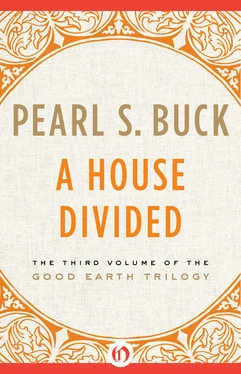Thus the days drew on quickly to Ai-lan’s marriage day. It was to be a very great wedding, and to the largest and most fashionable hotel in the whole city the guests were bidden to come at an hour before noon. Since Ai-lan’s father was not there, and since the old uncle could not stand so long, her elder cousin took his place, and beside her was her mother, who never left her at all.
This marriage was according to a new fashion, and very different from the simple way in which her grandfather Wang Lung had taken his wives, and very different too from the old formal weddings of his sons in ways set and appointed by the forefathers. In these days the city people wed their sons and daughters in many ways, in some more old and in some more new, but be sure Ai-lan and her lover must have the very newest. Therefore there was much music from foreign instruments hired for the day and there were flowers set everywhere, and these alone cost many hundreds of silver pieces. The guests came in all the various garb of their races, for Ai-lan and her lover counted such people among their friends. These all gathered in a vast hall of the hotel. Outside, the streets were choked with their vehicles and with the idle and the poor who pressed to see what they could, and to try what they could do to gain something from the day, to beg or to slip their hands unseen into pockets of the throng and take what they found there, although guards had been hired to hold them back.
Through this great throng Yuan and the mother and Ai-lan rode, the driver incessantly sounding his horn lest some be crushed, and when the guards saw their vehicle and the bride, within, they darted forward shouting out, “Make way — make way!”
Through all this din Ai-lan rode proudly, silent now, her head bent a little beneath the long veil held to her head by the two pearls and by a circle of small fragrant orange flowers. She held between her hands a great cluster of white lilies and small white roses, very fragrant.
Never had there been so beautiful a creature. Even Yuan was awed by her beauty. A little cool set smile hung on her lips, though she would not let it out, and her eyes glittered black and white beneath her lowered lids, for well she knew her own beauty, and there was not one whit of it she did not know and had not fostered to its utmost height. The very crowd fell silent before her, and when she stepped out, its thousand eyes fastened on her hungrily and drank in all her beauty, at first silently and then with restless murmurings, — ”Ah, see her!” “Ah, how fair, how fair!” “Ah, never such a bride was seen!” And be sure Ai-lan heard it all, but she made as if she did not.
So, too, when she came into the great hall, when the music set the moment, did all the crowded guests turn their heads and that same wondering silence came upon them. Yuan, who had gone first and stood with the man who was to wed her, saw her corning slowly between the guests, two little white clad children before her scattering roses for her to tread upon, and maidens with her, too, clad in silks of many hues, and he could not but share the wonder at her beauty. Yet, even so, even at that moment, although he did not know it until afterward, he saw Mei-ling very clearly, for she was with Ai-lan as attendant.
Yes, after all the wedding was over, and the contract read between the two, and when they had bowed to those who stood for the two families, and bowed to the guests and all to whom such courtesy was due, when all was over, the mighty feast and the merry-making and the wedded pair were gone to have a holiday together, then thinking of it all upon his return to his home, Yuan remembered, and he was surprised he did, the girl Mei-ling. She had walked alone before Ai-lan, and even Ai-lan’s radiance had not made Mei-ling seem unnoticeable. Now Yuan remembered very well she wore a soft long robe of apple green, the sleeves cut very short, and the collar high, so that above the color her face looked clear and somewhat pale and resolute. The very difference to Ai-lan made her hold her own against such beauty. For Mei-ling’s face owed nothing to its color or to its changefulness or sparkling eyes or smile, as Ai-lan’s did. Its good high look was from the perfect line of bone beneath the firm clear flesh, a line which, Yuan thought, would keep its strength and nobleness long past its youth. She looked older now than her age was. But some day in her age her straight low nose, her clean oval cheeks and chin, her sharp-cut lips, the straightness of her short black hair shaped smoothly against her head, would give her youth again. Life could not greatly change her. Even as now a certain gravity was hers, so in her maturity she would still be young.
Yuan remembered this gravity. Of all that wedding party only two were grave, the mother and Mei-ling. Yes, even at the feast, when wines of every foreign sort were poured out, and all the tables full of guests were crying out such wit as they did not know they had before, when glass was lifted high to glass, and the bride and groom joined in the laughter as they made their way between the guests, even then Yuan saw at his table that the mother’s face was grave, and so was Mei-ling’s. These two talked together in low tones often and directed the servants here and there, and took counsel with the master of the hotel, and Yuan thought they were grave because of all these cares, and he let it pass and looked about the brilliant hall.
But that night when they were alone after all was over, and the house was silent save for servants passing here and there to set covers right again and bring order everywhere, the lady sat in her chair so silent and downcast that Yuan felt he must say something to make her lift her heart up somehow, and so he said kindly, “Ai-lan was beautiful — the loveliest I ever saw — the loveliest woman.”
The lady answered listlessly, “Yes, she was beautiful. She has these three years been counted the most beautiful among the young rich ladies of this city — famous for her beauty.” She sat awhile and then she said with strange bitterness, “Yes, and I wish it had not been so. It has been the curse of my own life and of my poor child’s that she has been so beautiful. She has needed to do nothing. She has not needed to use her mind or hands or anything — only to let people look at her, and praise flowed in upon her and desire and all that others work to gain. Such beauty only a very great spirit can withstand, and Ai-lan is not great enough to bear it!”
At this Mei-ling looked up from a piece of sewing she had in her hands and cried softly and beseechingly, “Mother!”
But the lady would say on, as if for once her bitterness was more than she could bear, “I say only what is true, my child. Against this beauty have I fought my whole life, but I have lost. … Yuan, you are my son. I can tell you. You wonder that I let her wed this man. So may you wonder, for I do not like or trust him. But it had to be — Ai-lan is with child by him.”
So simply did the lady say these dreadful words. Yuan, hearing them, felt the beating of his heart stop. He was yet young enough to feel the horror of this thing, that his own sister…He glanced in great shame at Mei-ling. Her head was bent over the bit of cloth she held, and she said nothing. Her face was not changed, only more grave and quiet.
But the lady caught Yuan’s glance and understood it. She said, You need not mind, for Mei-ling knows everything. I could not have borne my life if I had not had her. She it was who helped me to plan and know what I must do. I had no one, Yuan. And she stayed a sister to my poor pretty foolish child, and that one leaned upon her, too. She even would not let me send for you, Yuan. Once I thought I must have a son to help me, for I am not used in all these new ways of divorce, and I could not tell your eldest cousin even, not anything, for I was ashamed. But Mei-ling would not let me spoil your years abroad.”
Читать дальше












